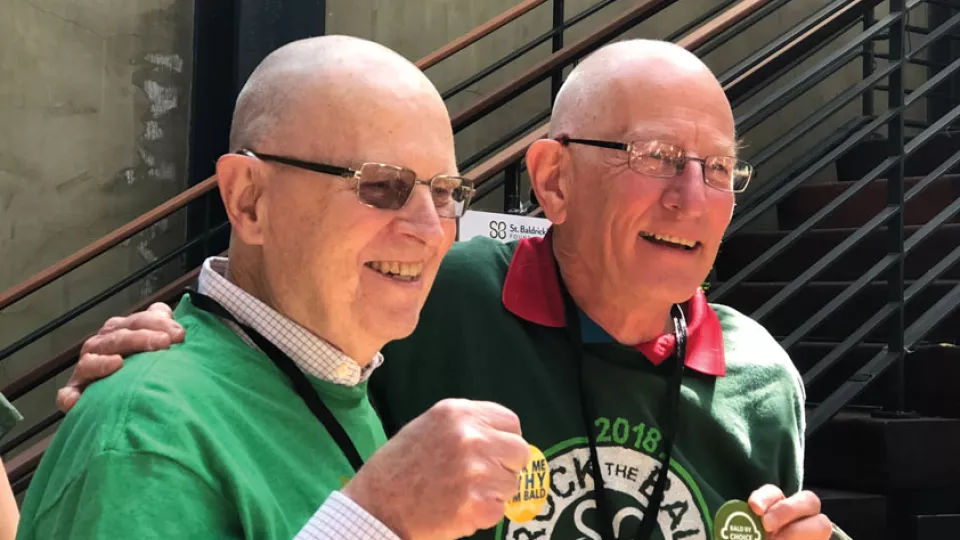
Shaving the Way to a Cure
St. Baldrick's Foundation
Grants from the St. Baldrick's Foundation are among the most competitive in the field of pediatric cancer. Since 2005, Children's Hospital Los Angeles has received nearly $7.4 million in philanthropic support from St. Baldrick's, the largest private funder of childhood cancer research in the U.S. and around the world. And it all started with a few shaved heads.
In 1999, three friends—all successful New York reinsurers—agreed they should share their good fortune. They took over a 2000 St. Patrick's Day celebration—the biggest annual party in their industry—by challenging attendees to shave their heads in solidarity with kids battling cancer. St. Patrick's was reimagined as St. Baldrick's, monetary donations poured in, and the rest, as they say, is history.
Head-shaving events now take place in nearly 30 countries each year, organized and supported by wide cross-sections of supporters, from businesses and students of all ages to firefighters and soccer moms. Funds raised at these events are combined and distributed to CHLA and other institutions where innovative research helps improve the quality of life for survivors—and holds the promise of one day curing childhood cancer. From 2000 to 2004, funds were distributed through the Children's Oncology Group (COG) and strictly supported clinical trials. In 2005, the St. Baldrick's Foundation was formed and began awarding other types of grants, including support for oncology fellows, young investigators and basic research. All applications go through a rigorous scientific review process, ensuring that every dollar St. Baldrick's awards—more than a quarter of a billion dollars worldwide since 2005—has the greatest impact for children with cancer.
Through the COG and 34 direct grants, St. Baldrick's has supported CHLA every year since its humble beginnings in 2000.
"We haven't been able to do that for every institution, and it certainly speaks to the quality, depth and breadth of the research going on at CHLA," says Kathleen Ruddy, chief executive officer of the St. Baldrick's Foundation, located 20 miles northeast of CHLA in the city of Monrovia.
CHLA physician-scientist Robert Seeger, MD, MS, is in the midst of a multiyear consortium grant from St. Baldrick's to support the New Approaches to Neuroblastoma Therapy (NANT) Consortium, which has its national headquarters at CHLA. The funded research seeks to enhance the immune system's ability to fight neuroblastoma, the second-most common solid tumor in children, by targeting both the cancer cells and surrounding cells that help the tumor grow and resist traditional treatments.
Michael Pulsipher, MD, section head of Blood and Marrow Transplantation at CHLA and head of the Pediatric Blood and Marrow Transplant Consortium (PBMTC), also nationally headquartered at CHLA, currently receives support from St. Baldrick's for evaluating cellular and immunological approaches to preventing relapse in children with acute lymphoblastic leukemia. In addition, St. Baldrick's recently awarded two grants to CHLA's Summer Oncology Research Fellowship (SORF) Program, led by Anat Erdreich-Epstein, MD, PhD. The fellowship provided two first-year medical students an opportunity to work in a pediatric oncology research lab for the summer in the hope that they will incorporate research into their future careers.
St. Baldrick's grant recipients are encouraged to organize signature head-shaving events, which CHLA has enthusiastically done every year since 2007, raising more than $209,000.
"CHLA is an important partner, not only on the research, but in collaboration with other institutions," Ruddy says. "[CHLA] understands the need to make sure every institution in the country is able to provide the same high-quality care for patients and works hard to share their expertise. That is extraordinary, and we are profoundly grateful for CHLA's leadership."


